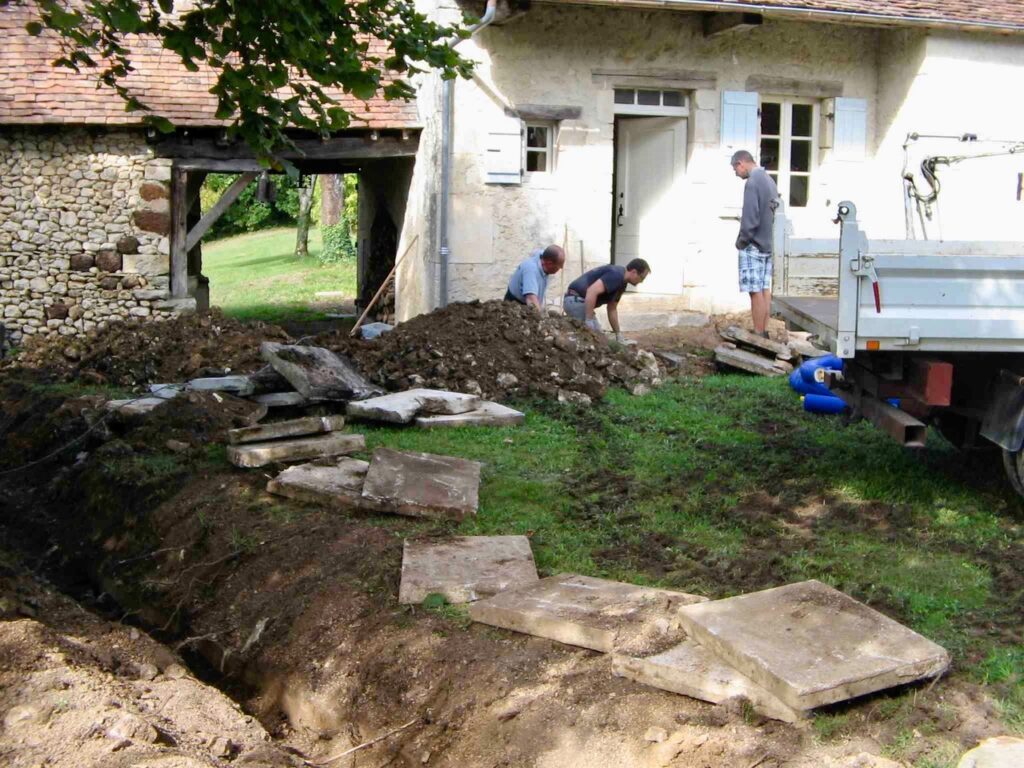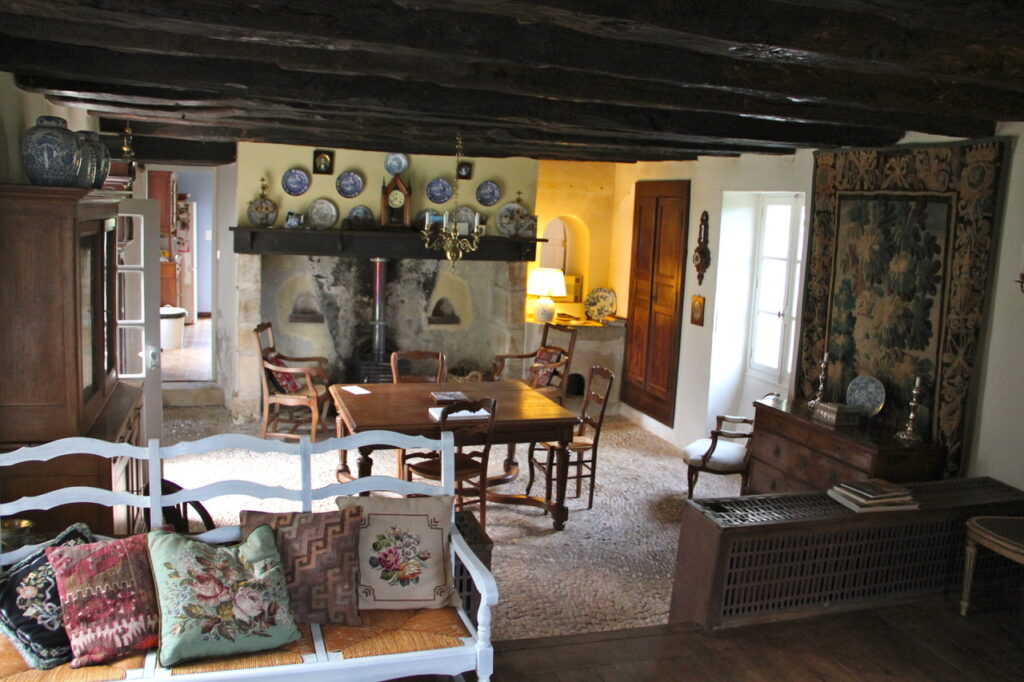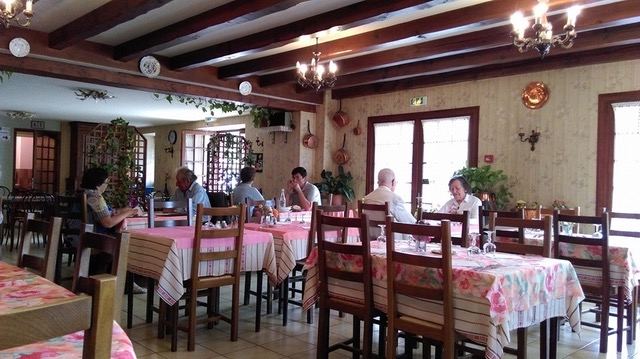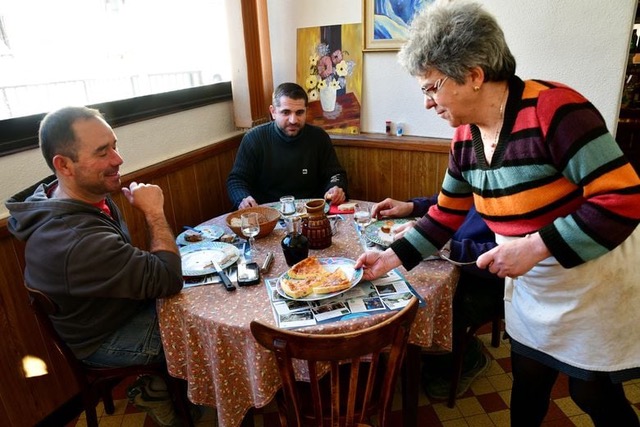
By Francesco Bianchini
The day finally came at La Placette when we saw Olivier’s back. Our French plumber might well deserve a mention in the Guinness World Book of Records for completing a total of two bathrooms and renovating our heating system in just nine months – or if you prefer, managing five inches of plumbing a day, and installing one faucet per month. Although we breathed a sigh of relief in seeing him off, we were far from satisfied. Nearing the finish line – in the eighth month of this story á la Genesis – we did have hot water, just not as hot as we would have liked. Not even lukewarm, a bland middle ground between that and cold. When I told Olivier this, he looked at me as if I were a member of a cult given to extravagant bodily suffering. I insisted that the water was fine for a shower but not hot enough for a bath. His laconic reply: the temperature of domestic water is regulated by law in France and cannot exceed fifty degrees Celsius.

La Placette, our first French renovation project, a corps de ferme in Dordogne.
Oliver’s last exasperating job was the installation of a bidet, that ‘French thing’ that prompts today, perhaps, only literary images of sleazy hotels for promiscuous mating, and/or fin de siècle brothels. (Coming from Italy, a country where the bidet is an integral part of the sanitary landscape, I perfected on my travels the art of doing acrobatics to make up for its absence.) Our plumber worked two full days – giving himself a two-week break in between. There was a rough surface on the underside of the porcelain where the drain is inserted that was giving him a headache. He wanted me to feel it. Not knowing a thing about plumbing fixtures, I sympathized and was led to believe in some manufacturing flaw. I called my Italian supplier who, after listening patiently, asked did they know of silicone in France. Olivier was unhappy and predicted dire consequences if the bidet, once glued down, had to be removed later. This wasn’t the first time (and won’t be the last) that we’ve come up against this objection: when French workmen install bathrooms they always leave an escape route – an incongruous hatch or the like – in case something goes wrong. When we returned home we found the bidet – itself the product of a happy marriage between aesthetics and old-fashioned functionality – connected to the wall by means of gray PVC joints, corrugated pipe, and twisted flexibles like a comatose patient on a life-support machine. That’s not all. Olivier also had mounted the toilet seat – a beautiful solid wood one – in such a way that the oval did not entirely match that of the ceramic. A little prank on his part? A bit of revenge for sometimes expressing our impatience? All doubt was dispelled when we saw in the other bathroom a similarly disfigured toilet upon which he had placed a piece of cardboard
scrawled with a large question mark.

The new plumbing system snakes slowly toward the house.

The ‘joy’ of renovating and dwelling at the same time.
We saw Olivier in the rare moments that he gratified us with his professional presence, but also from time to time in the neighboring town where Dan and I had taken to frequenting a local eatery. Every village and small town in France has its home-style restaurant that is packed at lunch with lonely retirees, tradesmen, artisans, and workers who go to them to eat plentifully and inexpensively. This is another face of the French culinary experience, an almost maternal one: these hole-in-the-wall places are dispensers of good, cheap food, and they are also havens for care and consideration for those in the community who need the most. Regular patrons can expect to find their usual table as in an old-fashioned boarding house where personalized napkin rings identified their seat. In addition to Olivier, we always found an ancient and frail English couple occupying the same table – he never without his back to the window, she opposite – and also a blind man who was regularly drunk, and whom the waitress would escort in a motherly way to the door lest he sink his head right down into his soup bowl. Olivier was there almost every day, joining colleagues who worked on construction sites and along the highways, cashiers and secretaries, humble clerks. We should have guessed what to expect from him at the mere sight of the bistro’s bathroom, with its pipes exposed like a bovine digestive system. It was enough to see how he stuffed himself and heartily drank to understand how no one could work to the best of their ability after such a meal.

Typically French, a roadside diner.
The Relais des Chasseurs owed its name to a jumble of dusty stuffed heads hanging from the walls and rafters. Tables were covered in streaked and scarred waxed cloth; a clock ticked in its tall narrow case, a sideboard of the type called Saint Hubert stood crowded with chipped crockery, and a refrigerated counter for salads and desserts completed the decor. The restaurant had an á la carte menu, but why create a fuss when every day, for twelve euros, a five-course ‘workers’ menu, including wine and coffee, was on offer? For this we had our choice of vegetables, salads, sliced meats, pickles, and pâté de campagne from the buffet; a garlic soup or minestrone ladled communally from a steaming white tureen; main courses like brandade de morue, coeur de boeuf, bavette d’aloyau, roast chicken, all with sides of fried or mashed potatoes, green beans, broccoli; then a selection of cheeses, and perhaps a piece of walnut cake, the specialty of the area. As the French say, pourquoi chercher
midi à quatorze heures? (Why go looking for noon at two p.m.?) The entry area was a barroom, where the most loyal customers enjoyed a glass of wine, a pastis, or a coffee at the end of the meal, and was the place to exchange the latest news, and to gossip with the owner. But we were kept in the loop by the waitress who relayed details of the life and death of the other patrons as soon as they turned heel, who was seeing who, whose driver’s licenses had been confiscated for DUI the night before. She was also the one who, as soon as we were seated, slapped our regular half-litre of rosé on the table. The thud that made us wince each time was not a sign of disrespect, rather an indication that, by crossing the threshold, we were at home.

Service with a thud and a smile.







